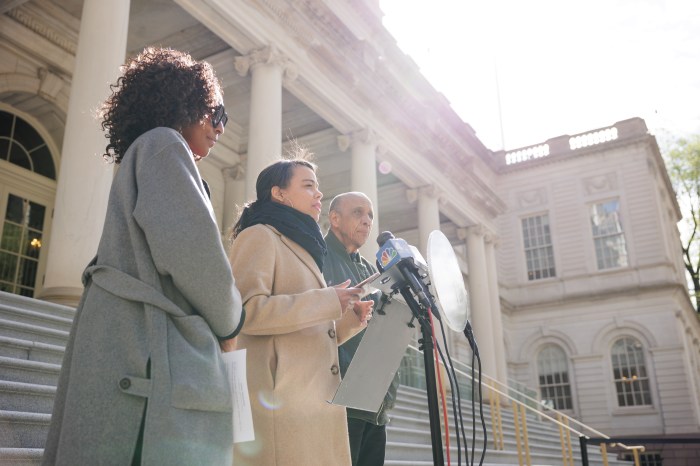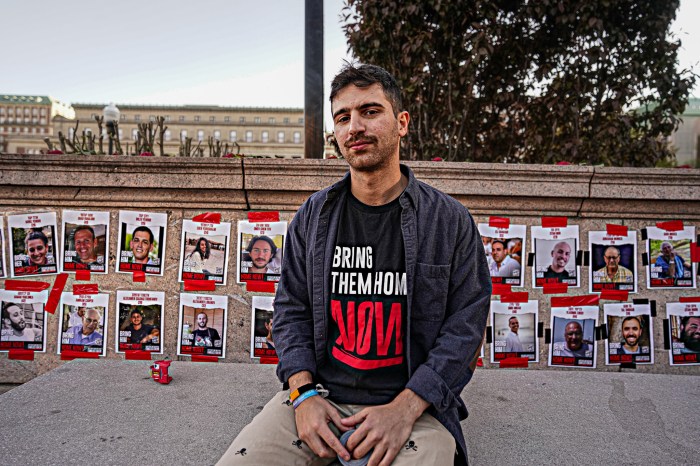Defense department spokesman insists opposition to gays in military would not change
Pentagon lawyers have asked Congress to repeal the military’s ban on consensual sodomy, according to a document recently released by the Service Members Legal Defense Network (SLDN), an advocacy group for gays and lesbians in the military.
In a memorandum written after an annual review conducted by the Joint Services Committee (JSC) on Military Justice, a group composed of lawyers from every military branch, it was recommended that the ban on anal and oral sex under Article 125 of the Universal Code of Military Justice should conform more closely to civilian laws, and no longer make such sexual acts, at least among heterosexuals, a punishable offense. In 2003, the Supreme Court decriminalized sodomy in its 6-to-3 landmark Lawrence v. Texas decision.
The Pentagon’s principal deputy general counsel, Daniel J. Dell’Orto, has endorsed the committee’s review.
It is unclear what effect such a reversal would have on the military’s ban against gays and lesbians serving openly. Nevertheless, gay advocates immediately hailed the committee’s decision as a victory.
“This is significant because the military can no longer criminalize gays and lesbians simply for who they are,” said Steve Ralls, SLDN’s communications director.
Since Congress retains legislative purview over the military’s disciplinary code, the recommendation must be approved by the armed services committees of both the House of Representatives and Senate before facing floor votes as part of the 2005 Defense Authorization Bill, expected to come up in May.
The Don’t Ask, Don’t Tell policy prohibits gays and lesbians from serving openly in the American military. During Congress’ creation of the legislation in 1993, after former Pres. Bill Clinton initially sought to overturn the gay ban by executive order, proponents of the ban argued that under Article 125 gays and lesbians were by definition criminals, and therefore ineligible to serve. Amending 125 to allow consensual acts of anal and oral intercourse by members of the military would topple a significant underpinning of the gay ban.
A day after the April 21 New York Times report on the Joint Services Committee memorandum, Pentagon spokesman Lawrence DiRita said that even if Article 125 were eventually altered according to the JSC memo, the Pentagon would continue the ban on consensual sodomy by applying Article 134, which punishes offenses violating “good order and discipline.”
“The problem for the Pentagon is that you can’t make something constitutional or unconstitutional by changing the statute under which it is prosecuted,” said Ralls of the gay service members group. He was referring to recent federal court rulings that have called into question the constitutionality of the military’s sodomy ban.
The Lawrence decision set the stage for overturning archaic state sodomy laws that were often selectively enforced to harass gay men. Recently, the Army’s high court, the Army Court of Criminal Appeals, in U.S. v Bullock, overturned the sodomy conviction of a soldier who engaged in oral sex with a female civilian in his barracks room, stating that constitutional privacy rights allow service personnel to engage in consensual sex acts. As a basis for its decision that court cited language in the Lawrence decision by Justice Anthony Kennedy who wrote about “an emerging awareness that liberty gives substantial protection to adult persons in deciding how to conduct their private lives in matters pertaining to sex.”
In an earlier ruling in another case, U.S. v Marcum, the military’s highest appeals court, the Court of Appeals for the Armed Forces, said that all courts must now “engage in a searching constitutional inquiry” when considering the limits to a soldier’s private sexual life, but nonetheless upheld Air Force Sgt. Eric Marcum’s discharge for performing oral sex on another male soldier. The same court also said the Lawrence decision was applicable to the military.
“It appears the Pentagon is trying to avoid further litigation under 125 based on Lawrence,” said Sharon Alexander, a staff attorney for SLDN, referring to DiRita’s statement about prosecuting homosexual sodomy under the “good order” article of the military’s disciplinary code. “Although this can only be a good thing, it is not a clear-cut victory.”
Alexander pointed out that although Article 125 might be nullified, the Pentagon still intends to prosecute acts of gay sex, indicating that the Joint Services Committee memo suggested that Article 134, the “good order” measure, be used against homosexual sodomy under the Manual for Courts Martial. Unlike the Universal Code of Military Justice, the president, not Congress, formulates courts martial procedures.
Given the recent court rulings, the Pentagon seems to be gearing up for a fight that will in some ways make it harder for gays and lesbians to challenge their discharges on constitutional grounds.
“It appears the best location in which to address consensual sodomy is within Article 134 instead of 125,” said Lt. Col. Joseph Richard, a Defense Department spokesman. “That is why the move in location was made. To avoid continued constitutional attacks against ‘sodomy’ charges brought under Article 125.”
Richard said that the Marcum and Bullock decisions prompted the military to review the disciplinary code’s handling of service members’ sexual behavior.
“As an Article 134 offense, the prosecution can rely on the facts and circumstances themselves to establish ‘conduct prejudicial to good order and discipline or service-discrediting’ or present evidence aside from the act and facts surrounding it,” Richard added.
“We have a host of reasons for separating persons based on their conduct or situation that is incompatible with military service,” he said.
Richard’s statement seemed to indicate that military leaders still view the presence of openly gay and lesbian service members as undermining military readiness.
Alexander, the SLDN attorney, underscored that it was too soon for opponents of the military’s gay sodomy ban to celebrate. “Service members need to be extremely cautious,” she said. “Sodomy is still a crime in the military. And even if 125 is modified, the risk of being disciplined under 134 for gay military personnel is extremely great.”
gaycitynews.com


































